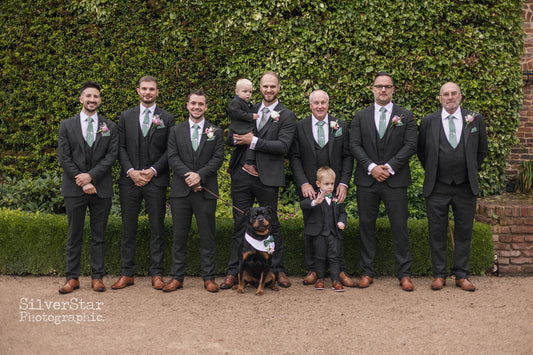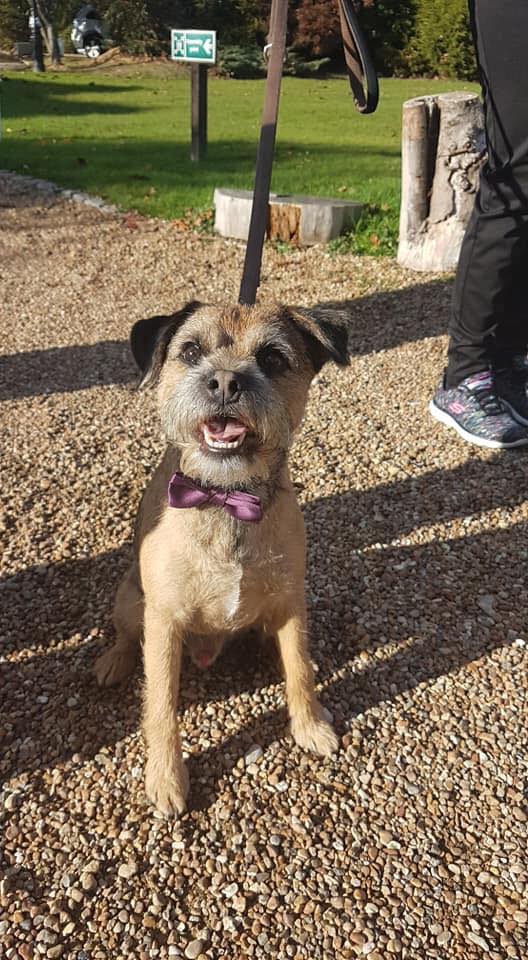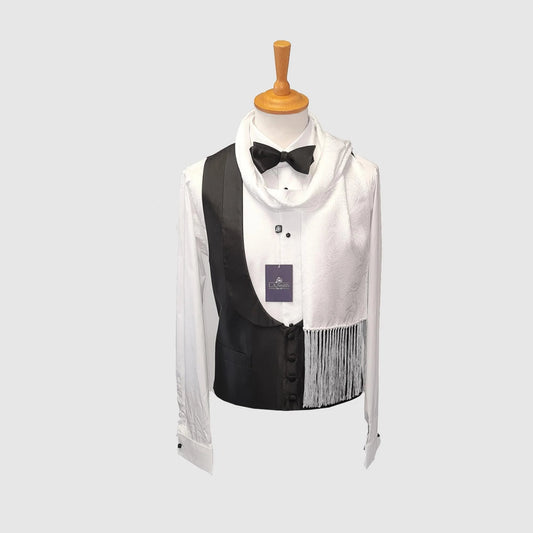Planning a wedding involves many decisions, and one common question that arises is: What is the difference between groomsmen and ushers? While both roles are part of the groom's entourage and serve important functions on the wedding day, they have distinct responsibilities. Understanding these differences can help you plan your wedding party and assign roles more effectively.
In this blog, we’ll break down the key differences between groomsmen and ushers, what each role entails, and how to choose who fits each role in your wedding.
First of all: What Are Groomsmen?

Groomsmen are typically the groom’s closest friends, family members, or people who have played a significant role in his life. Their duties go beyond just standing by the groom during the ceremony; they are part of the core wedding party and are involved in various pre-wedding and wedding day activities.
Key Responsibilities of Groomsmen:
1. Pre-Wedding Support: Groomsmen often help with wedding planning tasks and offer moral support to the groom. They may assist in choosing suits or tuxedos, help plan the bachelor party, and provide advice along the way.
2. Bachelor Party Planning: While the best man traditionally takes the lead, groomsmen usually help plan and participate in the bachelor party or weekend festivities.
3. Wedding Day Duties: On the day of the wedding, groomsmen are responsible for standing with the groom at the altar. They’re also often involved in helping to greet guests, assist with the groom’s attire, and ensure everything runs smoothly.
4. Photos and Formalities: Groomsmen will participate in formal photos and are typically present for key moments, such as the ceremony procession, reception entrances, and speeches (if applicable).
So What Are Ushers?

Ushers, on the other hand, play a more specific role focused on helping with the logistics of the wedding ceremony itself. While groomsmen are part of the wedding party and stand with the groom, ushers are typically in charge of greeting guests and guiding them to their seats.
Key Responsibilities of Ushers:
1. Guest Seating: The primary duty of an usher is to welcome guests as they arrive and direct them to their seats. They ensure that family members and important guests, such as the bride and groom’s parents and grandparents, are seated in the appropriate reserved areas.
2. Handing Out Programs: Ushers often distribute wedding programs or order of service sheets to guests as they arrive.
3. Managing the Aisle: Ushers can help manage the flow of guests down the aisle, ensuring that everything runs smoothly and on schedule.
4. Assisting Late Arrivals: If any guests arrive late, it’s usually the ushers' responsibility to guide them to their seats discreetly, without disrupting the ceremony.

Key Differences Between Groomsmen and Ushers
1. Role in the Ceremony:
- Groomsmen stand at the altar with the groom and are a visible part of the wedding party.
- Ushers are responsible for assisting guests with seating and usually do not stand at the altar unless they are also serving as groomsmen.
2. Involvement in Pre-Wedding Events:
- Groomsmen are more actively involved in pre-wedding events like the bachelor party and may help with wedding-related tasks.
- Ushers typically have fewer pre-wedding responsibilities, focusing primarily on their role during the ceremony itself.
3. Attire:
- Groomsmen are part of the formal wedding party, and their attire is usually coordinated with the groom's suit or tuxedo. They often wear matching ties, pocket squares, and accessories.
- Ushers may wear similar attire, but they are not always as closely coordinated with the rest of the wedding party. Some couples opt to have ushers wear simpler suits or distinguish them with slightly different accessories, like ties or boutonnières.
4. Number of People:
- Groomsmen are generally a smaller group, typically ranging from 2-7, depending on the size of the wedding.
- Ushers can vary in number based on the guest count. A larger wedding may require more ushers to help seat guests quickly and efficiently.

Can Someone Be Both a Groomsman and an Usher?
Absolutely! It’s not uncommon for one or more groomsmen to also serve as ushers. If you have a smaller wedding party, you may want your groomsmen to help out with seating guests before the ceremony begins. Once their usher duties are complete, they can take their place at the altar.
How to Choose Groomsmen and Ushers
When choosing your groomsmen, focus on close relationships—your best friends, brothers, or even cousins. These are the people who have been important in your life and who you want by your side on one of the biggest days of your life. Don’t feel pressured to ask someone just because you were in their wedding. Choose people who mean the most to you.
Ushers are often friends or family members who might not be as close to the groom as the groomsmen but still play an important role. You might consider younger cousins, close family friends, or friends who weren’t included as groomsmen but you still want involved in the ceremony.

So whether you’re assigning someone as a groomsman or usher, each role contributes to making your wedding day a success. Groomsmen help create memories leading up to the big day and stand with you at the altar, while ushers ensure the day runs smoothly for your guests. Both roles are vital, and choosing the right people for each will enhance your wedding experience.
If you’re looking for the perfect gifts to ask your groomsmen and ushers to be part of your day, Swagger & Swoon offers personalized proposal boxes, cufflinks, ties, and other accessories to make the moment memorable. Whether it’s a groomsman or an usher, show them how much you appreciate their support!




